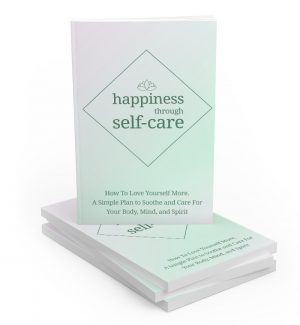 License Type: Master Resell Rights
License Type: Master Resell Rights  File Type: ZIP
File Type: ZIP
 SKU: 63011
SKU: 63011  Shipping: Online Download
Shipping: Online Download
Sample Content Preview
Introduction
Life would be that much easier if you loved yourself. Too many people live with low self-esteem. Too many other people are simply indifferent toward themselves.
When was the last time your Mum asked if you were ‘looking after yourself’? Can you honestly say that you are?
Too often, we place too much pressure on ourselves, or we expect too much of ourselves. We are constantly working hard toward our goals, and we beat ourselves up if we are anything other than perfect in that pursuit.
Is it any surprise we are often over-tired, malnourished, and depressed?
What a difference it would make if you spent time looking after yourself. If you surrounded yourself with friends who loved you, if you gave yourself a break every now and then, and if you told yourself you were doing great.
What if you really loved who you were, and you were satisfied with what you had?
Simple: you’d be content. You’d be healthier, happier, and more fulfilled. And that feeling would emanate from you and affect everyone you interacted with.
How do you get from here to there?
In this book, we will see that this requires a two-pronged assault. We need to change our thinking and the way we consider ourselves, and we also need to change the way we look after ourselves. What we eat, how we spend our time, and how we control our environment.
I liken this to looking after yourself the way a mother might look after her children. That means not only taking care of yourself physically by grooming, feeding, and making sure that everything else is done right – but also taking care of yourself emotionally. When you’re down, a good mother will tell you not to worry, and that you’re great. If we treated ourselves like this and internalized that kind of affection, the world would be an easier, kinder place.
Each chapter in this book will tackle one of these aspects, and by the end we’ll have a blueprint of self-care that will nourish our health, and our soul!
Chapter 1: Self-Care Using CBT and Mindfulness
First, we start by changing the way we talk to ourselves. And this begins with mindfulness and CBT.
CBT, or Cognitive Behavioural Therapy, is the current favourite approach in clinical psychology and it is going to be one of the most important tools in this book for transforming the way we view ourselves.
Where once every counsellor you went to was using psychodynamic principles to treat patients, today they are all using CBT (or an integrative approach). While it’s probably only a matter of time before a new school comes along and knocks CBT off the top spot, it still represents a powerful tool that the NHS in the UK and many others have used to quickly and cheaply improve the lives of millions of patients. The ‘quickly and cheaply’ parts are also crucial as they mean that anyone can apply the principles and see immediate benefit, improving their self-esteem with no need to spend tonnes of money and time on counselling. Obviously if your symptoms persist you should seek professional help, but until then you can try some DIY to see if CBT is what you need to improve your self-concept.
A Brief History and Explanation
Essentially, CBT is composed of two concepts – behaviourism and cognitive psychology (as the name might suggest). Behaviourism is the old school of thought that states how we learn to associate an event with an outcome to such a degree that we can begin treating the event as the outcome.
For example, in Pavlov’s famous experiment using dogs, he taught his canine subjects to salivate at the sound of the bell by getting them used to hearing the bell while they ate.
This applies to your self esteem, in that you can end up having physical reactions to conditions where you’re put under pressure. For example, you might find that in social situations you find yourself trembling or sweating as through your perception you’ve learned to associate them with leading to embarrassment or humiliation. Alternatively, you might find yourself feeling depressed or lethargic when you’re attempting something new if you’ve failed several times in the past. Here the bad outcomes act as ‘reinforcement’, instructing you that your ambitions are doomed to failure. This is a learning mechanism that we’ve evolved which normally helps us to avoid making mistakes and which is generally adaptive in most situations. In modern society however there are times when it’s misplaced and can be psychologically damaging.
Behavioural therapy to cure such associations involves ‘reassociation’. This would mean teaching yourself to learn that putting yourself out on a limb can lead to positive outcomes too. You might achieve this by going to lots of social settings that you know you’ll enjoy, or by trying lots of new things that you think you’ll be good at.
You should also make sure you surround yourself with positive people who will compliment and encourage you rather than put you down. This way you will also be getting constant reinforcement that you’re a worthwhile and capable person.
Since behaviourism though, psychology has moved on realising that there is a conscious aspect in many of our problems. This is the crucial contribution that CBT makes by introducing a cognitive aspect to our brain and to our anxieties.
In the case of problems like low self-esteem, the cognitive aspect could be negative ruminations where you think about how everything will go wrong, negative self-talk or talking yourself out of doing things.
In the next chapter, we’ll look at how you can use this important added component in order to silence the “inner critic” for greater peace and happiness.
Chapter 2: Silencing the Inner Critic
Patients with low self-esteem will often describe how they have a ‘little voice’ in the back of their head constantly telling them they’re going to fail. Other concepts in CBT are ‘over generalisation’, whereby you assume that because you’ve failed at one task you are going to fail at all tasks, and ‘false hypotheses’, where you incorrectly predict that you’re going to fail at your tasks. We will be employing CBT techniques in order to help overcome this self-doubt.
Mindfulness
CBT practitioners then have devised various methods that you can use to combat these problems. One of the most commonly used of these is actually borrowed from meditation and is known as ‘mindfulness’. Here patients are instructed to find a quiet place and to sit down with their eyes closed. Much like in meditation they are then instructed to reflect on their inner thoughts. This doesn’t mean that they should attempt to clear their minds however, instead they are instructed to merely ‘watch’ thoughts as they pass by without engaging in them, merely observing the content of their brains as they might watch clouds passing in the sky. This way they can identify the kinds of things they are thinking and in particular any destructive thoughts they might be having.
As patients get better at this they are supposed to be able to do it during day to day activities and then intervene; spotting the negative and damaging thoughts and seeing them for what they are.
Most negative ruminations are illogical and even if they aren’t they certainly do more harm than good, so learning to spot them and then put an end to them is a valuable skill. Similarly, to aid in this culture of mindfulness, patients are asked to keep diaries of their thoughts and activities – then to read them back and see how anything they’ve said or done could be disruptive to their selfimage.
Positive Self-Talk
You can also counter these negative thoughts with positive ones, utilising ‘positive self talk’ to reaffirm your worth. Here you should make sure to focus on your good point, and to remember compliments you may have received in the past. Instead of telling yourself you’re fat constantly, replace this with reminders about your nice eyes or straight teeth. You’d be surprised by how affective this can be.
Hypothesis Testing
Patients are also told to practice ‘hypothesis testing’, where they are encouraged to test their false hypotheses hopefully realising that they are unfounded. For example, if a patient is scared to speak in public because they are concerned they’ll stutter and fail, then they are encouraged to actually try speaking in public to find out if this is in fact the case. More often than not they’ll find it isn’t. This also works to prevent over generalisation and again as a way to counter any negative associations they’ve developed.
So, if you’re suffering from low self-esteem then you might want to try applying these principles to your life. Make sure you continue to go out and to challenge yourself, even if you genuinely are less than skilled at what it is you want to achieve this is the only way you are going to improve.
Becoming reclusive will only give you more time to ruminate and send you into a downward spiral. Similarly, surround yourself with positive friends and colleagues and try to focus on the good aspects of what you do. Support yourself with positive self-talk and try to catch yourself having negative thoughts and stamp them out. If this still doesn’t work, then it’s perhaps time to seek help from a professional who can talk you through the process.
- License: Master Resell Rights
- Category:Audio & Videos
- Tags:2019 Ebooks Master Resale Rights








